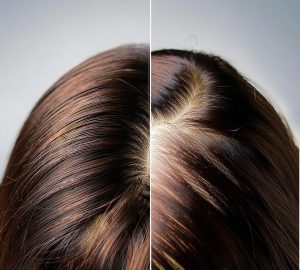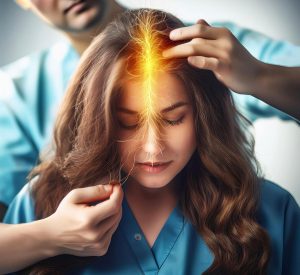Hair loss is when you lose more hair than usual from your scalp or other parts of your body. It can happen to anyone, and there are many reasons why it occurs. Normally, we all shed some hair every day, but with hair loss, the amount of hair falling out is more than what grows back. This can cause thinning hair, bald spots, or a receding hairline. Hair loss can be caused by many factors, such as genetics (it runs in your family), changes in hormones, stress, poor nutrition, certain medical conditions, or side effects of some medications. While some hair loss is normal and part of the hair’s natural growth cycle, excessive hair loss may require attention or treatment to help keep your hair healthy.


Hair thinning is when your hair becomes less dense or less thick than it used to be. Instead of losing large patches of hair all at once, the hair slowly becomes thinner all over your head. It can make your hair look flat. You may notice that your scalp is more visible, or your ponytail looks smaller. It happens gradually, so you might not see it right away. Hair thinning can be caused by several factors, such as aging, stress, genetics, lack of proper nutrients, over-styling (like using heat or chemicals), or medical conditions. While it’s normal to lose some hair every day, thinning hair means that your hair is not growing back as fully as it used to.
Our hair needs certain vitamins and minerals to grow strong and healthy. These nutrients, like iron, zinc, and vitamins A, C, D, and E, play a vital role in keeping hair healthy. If your body does not get enough of these, your hair might become weak, thin, or fall out more than usual.
Vitamin D is often called the “sunshine vitamin” because our bodies make it when we get sunlight. It is also found in some foods like fish, eggs, and fortified milk. Vitamin D helps our body use calcium, which is important for hair growth. It helps to form new hair follicles, the tiny pores where new hair grows. Lack of vitamin D can cause hair to thin or fall out. This is because vitamin D helps keep the hair follicles healthy.
Signs and symptoms of Vitamin D deficiency are hair fall or thinning of hair. Other signs include feeling tired, muscle pain, and weak bones. You might also get sick more often because vitamin D helps your immune system.


To increase vitamin D levels for better hair health, spend time in the sun. Try to spend 15-30 minutes in the sun a few times each week. You can also eat foods rich in vitamin D, like fish, egg yolks, and fortified foods like orange juice and cereals. Taking vitamin D supplements can also help. Most adults should get about 600 to 800 units of vitamin D each day. These units are called “international units,” or IU. Older adults might need more. If you are losing hair or think you aren’t getting enough vitamin D from sunlight or food, it’s a good idea to talk to a doctor. The doctor can check your vitamin D levels and tell you if you need to take a supplement or change your diet to get more vitamin D. Other steps that helps to prevent hair loss, make sure you eat a balanced diet rich in vitamins and minerals. Take care of your scalp by washing it regularly with a mild shampoo. Avoid hairstyles that pull on your hair too tightly. Try to manage stress with relaxation techniques like yoga, meditation, or regular exercise.
If you see a lot of hair loss or thinning, you should talk to a doctor. They can check your vitamin D levels with a simple blood test and provide guidance on how to ensure you’re getting the right amount of this vital nutrient. Your doctor may also check for other causes of hair loss and recommend the best treatment options. You can also consult with our specialists at the London Aesthetics and Rejuvenation Centre for personalized advice and solutions.



